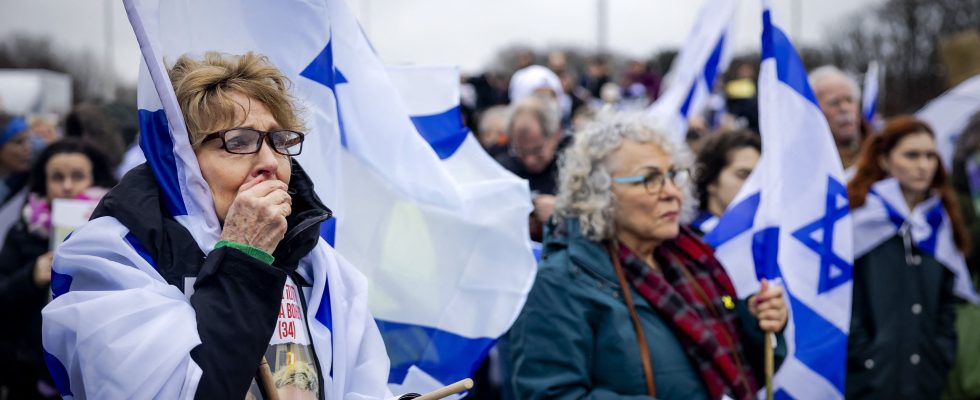“Welcome aboard El Al Flight 131, like the 131 days your loved ones spent in captivity. We will use this code to signal to the world that they must be released as soon as possible.” On Wednesday February 14, around a hundred family members of hostages held in Gaza, who had not known each other four months ago, met at Ben Gurion airport in Tel Aviv, to make a 24-hour round trip to The Hague. Two former captives are also on the trip. The goal of the mission: to support a complaint filed against Hamas leaders before the International Criminal Court (ICC), which opened an investigation into the October 7 attacks.
A cry of alarm for the rest of the world
Supported by a team of 150 lawyers working on behalf of the Forum of Families of Captives and the Missing, these relatives submitted a 1,000-page report including the testimonies of hostages already released. It supports allegations of “genocides, crimes against humanity and war crimes”, including “kidnappings, murders and acts of sexual violence” committed by Hamas. This approach aims to obtain arrest warrants against the leaders of the organization wherever they are.
But for the families of the hostages and the survivors of the October 7 massacres who traveled to The Hague, the procedure is above all an opportunity to sound a cry of alarm. “The world can no longer remain silent. The international community must place itself on the right side of history,” they insisted, in the pouring rain, during a rally held near the headquarters of the ICC.
“I am making this trip to remember that on this disastrous Saturday, we experienced a real holocaust,” explained Maccabit Mayer, wearing a black sweatshirt flanked by the portrait of her nephews Zvi and Gali Berman, twin brothers aged 26. Kidnapped from their homes on the Kibbutz of Kfar Aza, on the edge of the Gaza Strip, they were seen alive by former hostages released at the end of November during a military truce. Since then, the family has had no news. “We demand justice,” she added. “These abuses can be repeated anywhere in the world. The leaders of Hamas must be outlawed, in Qatar as in Turkey.”
The Hague, symbol of the debate on international justice
The one who has already flown to Berlin, Munich or Augsburg in order to “make the voice of her nephews heard”, who also hold German nationality, is a regular on the multiple journeys in which the relatives of some 130 Israeli hostages take part – including around thirty declared dead by the IDF – still detained in Gaza. Within the Forum of Families of Hostages and the Disappeared alone, around a hundred delegations have been organized abroad to bring their message to the international stage. But the mission carried out in The Hague, which brought together a record number of participants, takes on a special character.
“It is here, in The Hague, that South Africa shamefully accused Israel of genocide before another body, the International Court of Justice,” was indignant during this trip Jucha Engel, whose father was deported to Auschwitz. His grandson, Ofir, an 18-year-old basketball player, was released at the end of November after spending more than fifty days in captivity in Gaza. Just like Raz Ben Ami, kidnapped from Kibbutz Beeri but whose husband Ohad remained in the hands of Hamas. Surrounded by her two daughters, she reminded the podium of the Hague rally that “every second puts the lives of the captives in danger”, before chanting in unison with her comrades in misfortune the slogan “Bring them home now “.
At his side, Sharon Kalderon, the sister-in-law of one of the three Franco-Israeli hostages held in Gaza, Ofer Kalderon, whose two children Erez and Sahar were released, considers it essential to fight on all fronts. “The world needs to know,” says the woman who, on October 7, remained locked up for thirty-four hours in her shelter on Kibbutz Sufa. “When Ofer and the children managed to escape through the window of their house and hide in the bushes, they were discovered by a teenager from the Gaza Strip, before being kidnapped. Hamas terrorists benefited from the complicity of civilians. Everyone must be punished.”
But at the same time, argues Sharon Kalderon, it is urgent not to relax the pressure, abroad as in Israel, in order to achieve an agreement to release all the hostages. “Only an agreement could give us a little hope,” adds Dror Or, whose brother, a 49-year-old entrepreneur, was kidnapped from Kibbutz Beeri, with his two children released at the end of November, while their mother, Yonat, was murdered during the attacks. “Our army itself recognizes that operations to rescue captives are dangerous,” he explains. “We must continue to eradicate Hamas, but first do everything to free our captives.”
On their return to Tel Aviv, many of the travelers from The Hague participated that evening in demonstrations organized in front of the Kirya, the IDF headquarters, to urge the war cabinet to speed up the negotiations which were being held this week in Cairo . “This is the last chance operation,” they shouted, handcuffed, in front of the Begin Gate barricades. “Don’t sacrifice the hostages!”
